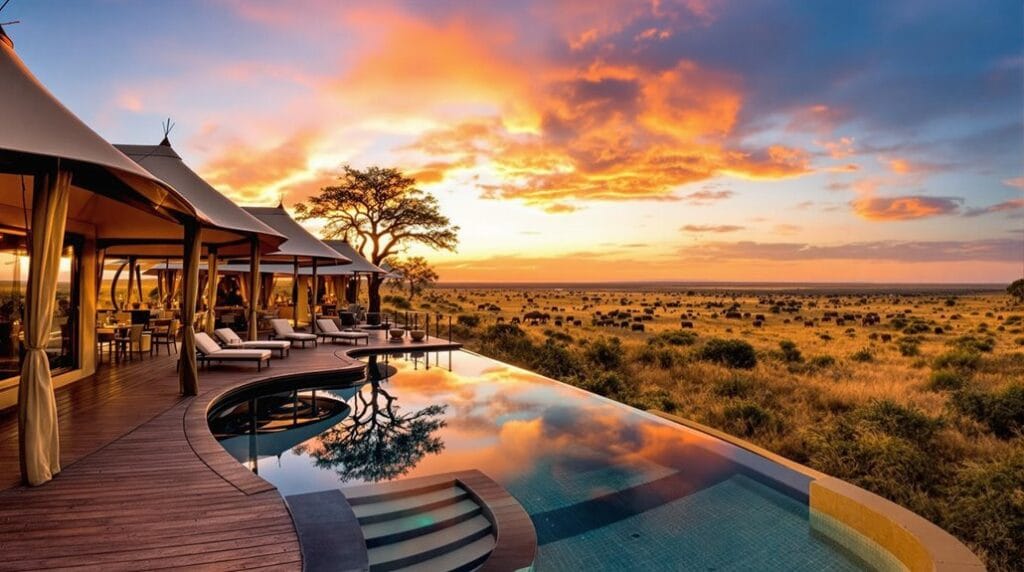You might think you know what ecotourism and wildlife safaris are all about, but there's often more beneath the surface. Responsible travel not only offers memorable experiences but also plays a vital role in conservation and community support. Different types of safaris provide distinct ways to engage with nature, yet each comes with its own set of challenges. As you consider the impact of your choices, what do you really understand about the principles guiding sustainable tourism? The answers might surprise you.
Key Takeaways
- Ecotourism prioritizes responsible travel that protects the environment and supports local communities through sustainable economic benefits.
- Wildlife safaris can include game drives, walking safaris, boat safaris, and photographic safaris, each offering unique nature experiences.
- Conservation efforts benefit both wildlife habitats and local economies, fostering education and biodiversity monitoring for healthier ecosystems.
- Sustainable tourism faces challenges such as social impacts, authenticity issues, and the need for regulation to protect sensitive areas.
- Engaging local communities in tourism planning enhances environmental stewardship and ensures that tourism benefits the residents culturally and economically.
Understanding Ecotourism Principles
When you think about ecotourism, it's all about responsible travel that not only immerses you in natural beauty but also helps protect the environment and supports local communities. At its core, ecotourism principles emphasize conservation and sustainable development. By prioritizing these values, you contribute to wildlife conservation efforts that preserve delicate ecosystems.
One essential aspect of ecotourism is education. By engaging with local guides and participating in interpretive programs, you enhance your understanding of ecological issues and appreciate the intricate balance of nature. This education empowers you to make informed choices that positively impact the environment.
Moreover, effective ecotourism guarantees that local communities benefit economically. Through your visits, you help generate income that fosters entrepreneurship, creates jobs, and enhances education through skills training. This not only supports the well-being of these communities but also encourages them to maintain their cultural heritage and environment.
Ultimately, by embracing the principles of ecotourism, you become a part of a movement that values conservation and sustainable practices, making a meaningful difference for both wildlife and the communities that call these natural spaces home.
Types of Wildlife Safaris
Wildlife safaris offer a thrilling range of experiences that connect you with the natural world. Among the most popular are game drives, where you can sit back in specially designed vehicles and encounter wildlife up close while minimizing disturbance. This type of safari provides a comfortable way to explore vast landscapes teeming with animals.
If you're looking for something more immersive, consider walking safaris. These allow you to explore the wilderness on foot, guided by experts who teach you about tracking, birdwatching, and plant identification.
There's something magical about feeling the earth beneath your feet as you share the space with nature.
For a unique perspective, boat safaris can be a fantastic option. Gliding along rivers or lakes, you'll spot aquatic species and animals that come to drink at the water's edge, all while enjoying a serene atmosphere.
Lastly, if you're passionate about photography, photographic safaris cater specifically to you. With expert guides helping you get the best shots while respecting wildlife, these safaris guarantee you capture the beauty of the natural world in every frame.
Each type of wildlife safari offers a distinct way to deepen your connection with nature.
Benefits of Conservation Efforts
Conservation efforts play a crucial role in preserving our planet's biodiversity and ensuring the survival of endangered species. By actively participating in ecotourism, you contribute to initiatives that protect habitats and combat poaching. These efforts not only safeguard wildlife but also support local communities economically and socially.
| Benefits | Impact |
|---|---|
| Habitat Preservation | Protects endangered species and ecosystems |
| Economic Support | Generates income for local communities |
| Education and Awareness | Fosters responsibility towards wildlife |
| Biodiversity Monitoring | Maintains healthy natural ecosystems |
| Positive Feedback Loop | Enhances both tourism and conservation |
Through your involvement, you help fund educational programs that raise awareness about ecological issues, creating a sense of responsibility among both visitors and locals. Conservation efforts promote the monitoring of wildlife species, ensuring that natural ecosystems remain resilient. As these initiatives succeed, they attract more tourism, creating a cycle where the economic benefits further enhance environmental protection. By choosing ecotourism, you become part of a community dedicated to making a difference for endangered species and the world we all share.
Challenges in Sustainable Tourism
While conservation efforts have made significant strides in promoting ecotourism and protecting wildlife, challenges remain that threaten the sustainability of this industry. One key issue is the social impacts of tourism, which can sometimes lead to a negative impact on local people. When communities become overly dependent on tourist dollars, it undermines their economic stability and job opportunities. Instead of investing in hiring and training local residents, some organizations prioritize short-term volunteer tourism engagements that fail to create lasting change.
Additionally, the authenticity of sustainability practices in ecotourism often comes under scrutiny. High fees associated with volunteer programs may not always be transparent, raising concerns about whether funds genuinely support local development projects. This lack of accountability can erode trust and hinder meaningful partnerships between tourists and communities.
Moreover, protecting sensitive ecological areas requires regulating access to guarantee visitation numbers and group sizes remain sustainable. Without these measures, the very ecosystems that attract tourists may suffer from overexploitation, further complicating the balance between ecotourism and conservation.
Addressing these challenges is essential for nurturing a more sustainable future for both wildlife and the local communities that thrive alongside them.
Engaging With Local Communities
Engaging with local communities is essential for the success of ecotourism, as it fosters a deep sense of ownership and pride among residents. When you connect with these communities, you enhance their environmental stewardship and conservation efforts, creating a positive feedback loop for the African wild.
Local involvement in tourism planning guarantees that sustainable economic benefits flow directly to the community, improving their quality of life.
By incorporating educational programs that highlight local cultural practices and traditions, you help visitors appreciate the community's heritage, promoting responsible tourism behavior. This not only enriches the visitor experience but also strengthens community identity.
Collaborating with local artisans and businesses showcases their skills and products, creating job opportunities and empowering residents to thrive.
Effective communication and partnership with local communities lead to better satisfaction for both tourists and residents. When everyone's expectations and needs are understood, it creates a harmonious environment where tourism can flourish.
Frequently Asked Questions
What Are the 4 C's of Ecotourism?
The 4 C's of ecotourism are essential for responsible travel.
First, conservation emphasizes protecting nature and biodiversity through sustainable practices.
Next, community engagement guarantees local residents benefit economically and socially from tourism, promoting their involvement in planning.
Culture highlights the importance of respecting and preserving local traditions, enriching your travel experience.
Are Safaris Ecotourism?
Imagine a traveler planting seeds in a garden, nurturing both nature and community.
That's what safaris can be when they embrace safari sustainability. You're not just witnessing wildlife; you're partaking in ethical tourism that prioritizes wildlife conservation and responsible travel.
What Is an Example of Ecotourism?
An example of ecotourism is visiting a wildlife sanctuary where you can engage in wildlife conservation and support sustainable travel.
As you explore, you'll enjoy nature education through guided tours and learn about local ecosystems.
By participating, you also promote community involvement, as a portion of your fees goes towards local projects.
This experience not only enriches your understanding but also fosters a sense of belonging to a movement that values both nature and communities.
What Is Ecotourism and Why Is It Important?
Ecotourism is responsible travel that emphasizes sustainable practices, community involvement, and conservation efforts.
By choosing ecotourism, you support local economies while learning about environmental education and the importance of preserving natural habitats.
This travel approach enhances your appreciation for nature and fosters a sense of belonging to a global community committed to sustainability.
It's not just about visiting new places; it's about making a positive impact and contributing to the world's ecological health.
Conclusion
Ultimately, embracing ecotourism and wildlife safaris is like planting seeds for a sustainable future. By prioritizing responsible travel, you not only experience the beauty of nature but also contribute to the well-being of local communities and the environment. Each adventure can help protect habitats and promote biodiversity, ensuring that future generations can enjoy the same wonders. So, as you explore, remember that your choices can create a positive ripple effect on the world around you.









